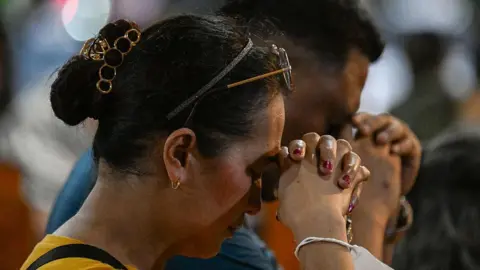The world’s Roman Catholic community is grappling with profound grief following the death of Pope Francis, who passed away peacefully on Easter Monday. His passing, occurring on one of the most sacred days in the Christian calendar – a day he himself celebrated by delivering an Easter Sunday address – has sparked widespread mourning and reflection from churches across the globe.
Services honoring the late pontiff commenced immediately, with solemn Masses held in the Philippines, where roughly 85% of the nation’s 110 million population identify as Roman Catholic. In Manila, worshippers gathered at the Metropolitan Cathedral to pay their respects, reflecting on the Pope’s significant influence, particularly on young Catholics like Jude Aquino, an altar server who described him as “a big role model” and a “vicar of Christ.” The timing of his death – coinciding with Easter’s celebration of resurrection – resonated deeply with many, highlighting the profound symbolism of his passing.
Across continents, echoes of sorrow were heard. In Vatican City, shock reverberated among those who witnessed Pope Francis’s final public duty during the Easter Sunday Mass. One attendee described the moment as “very shocking,” recalling a recent blessing received just days prior. Similarly, in rebel-held Bukavu, Democratic Republic of Congo (DRC), where approximately half the population is Catholic and the church represents the largest Christian community in Africa, mourners gathered at Notre-Dame de la Paix Cathedral – a location significant due to Francis’s 2023 visit, becoming the first Pope to address worshippers in the country in over three decades. During this visit, he called for an end to violence and expressed deep affection for the Congolese people. Seven days of national mourning have been declared in Brazil, home to the world’s largest Catholic population, with residents expressing admiration for his consistent advocacy and willingness to engage in dialogue.
Beyond these key locations, expressions of grief poured in from across Latin America, Europe, and beyond. In Spain, where more than half the population identifies as Catholic, three days of national mourning were declared, with citizens recalling Pope Francis’s universally accepted message of peace and understanding. Individuals like Nuria Ortega, a civil servant from Madrid, emphasized his appeal to both Catholics and non-Catholics alike.
Pope Francis’s papacy was marked by significant reforms aimed at addressing the decades-long issue of child sex abuse within the Church. While he faced criticism during his tenure for his handling of this sensitive subject, he is also remembered for his openness to victims and his commitment to fostering a more accountable institution. Juan Carlos Cruz Chellew, a survivor of clerical abuse in Chile, spoke powerfully about Pope Francis’s transformative impact, describing him as “a real father” who offered a listening ear and initiated meaningful change within the Church’s approach to such sensitive matters. He recounted a week spent with the Pope in Vatican City, where they engaged in long conversations about the situation, marking a pivotal shift in the Church’s response.
As the search for his successor begins, there is a widespread sentiment that the institution must embrace humility and actively connect with younger generations. Javier Herratia, a student in Spain, expressed hope that the next Pope would embody the values of compassion and openness demonstrated by Francis. The global Catholic community now faces the task of navigating this transition while honoring the legacy of a Pope who profoundly impacted the faith and lives of millions worldwide.

